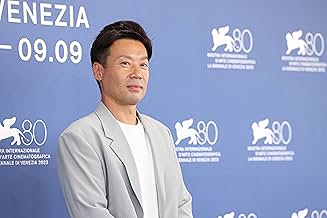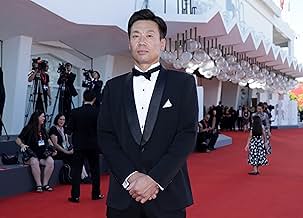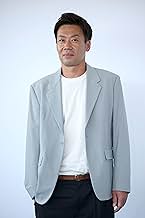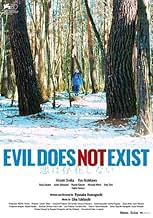NOTE IMDb
7,0/10
12 k
MA NOTE
Takumi et sa fille Hana vivent dans le village de Mizubiki, près de Tokyo. Un jour, les habitants du village prennent connaissance d'un projet de construction d'un camping, offrant aux citad... Tout lireTakumi et sa fille Hana vivent dans le village de Mizubiki, près de Tokyo. Un jour, les habitants du village prennent connaissance d'un projet de construction d'un camping, offrant aux citadins une "évasion" confortable dans la nature.Takumi et sa fille Hana vivent dans le village de Mizubiki, près de Tokyo. Un jour, les habitants du village prennent connaissance d'un projet de construction d'un camping, offrant aux citadins une "évasion" confortable dans la nature.
- Réalisation
- Scénario
- Casting principal
- Récompenses
- 18 victoires et 49 nominations au total
Avis à la une
This film was supposed to be a 30 minute cinematic accompaniment to a score that the director's friend made, only that during the collection of video material Hamaguchi had this story idea and made a full feature film instead. The story starts off intriguing: a small Japanese community in the mountains is slightly challenged by the arrival of a company that wants to build a camping resort in their area without any knowledge of or interest in local issues or the damage they would do. There is even a long town hall discussion between the company representatives and the townsfolk which was truly inspiring. I mean, I can't imagine a European or American community reacting in such a measured, well mannered, well thought out and informed manner.
But this is where the movie veers into the absurd. People make life changing decisions in seconds, without being challenged by the ones around them - kind of like Hamaguchi's decision to finish the film the way he did, musical score and nature scenes take the place of plot and then it's one of those WTF endings. Presumably, the author wanted us to make our own mind about what the movie is about. Well, director-sama, that's the same thing as having nothing in particular to say.
The cinematography was good, the music excellent, the interactions between people natural, authentic, deep. The story was absolute rubbish.
Bottom line: in the end, a short cinematic companion to a music score became a very long and obtuse cinematic companion to a music score. Top marks for the music!
But this is where the movie veers into the absurd. People make life changing decisions in seconds, without being challenged by the ones around them - kind of like Hamaguchi's decision to finish the film the way he did, musical score and nature scenes take the place of plot and then it's one of those WTF endings. Presumably, the author wanted us to make our own mind about what the movie is about. Well, director-sama, that's the same thing as having nothing in particular to say.
The cinematography was good, the music excellent, the interactions between people natural, authentic, deep. The story was absolute rubbish.
Bottom line: in the end, a short cinematic companion to a music score became a very long and obtuse cinematic companion to a music score. Top marks for the music!
In a way it starts very cleverly with very slow nature scenes, illustrating how closely connected these people are to their natural surroundings, how they live off and in harmony with the land. They gather wood for heating, they collect spring water for drinking and cooking, they recharge by walking long distances and admiring the stunning beauty of the surroundings, they memorize the different trees, they look out for wild animals, they help each other.
And then Hamaguchi is the perfect director to create a scene showing a public gathering with public speakers and audience interaction. He did a lengthy scene in Happy Hour as well. He can create meaningful dialogue with stand-out lines. And quite a bit of tension. And we move to the theme of capitalism corrupting everything in its path, with no regard for the destruction it leaves behind. It's facts, figures, stats, consultant advice, bending the law and using it to your advantage. The waste of five people is still below the accepted limit of pollution. It's better than city water anyway.
Then we dig deeper into the struggles of the glamping company workers, who are caught between empathizing with the locals and working for a man who wants to make money. He is not exactly a ruthless money man, he is actually trying to run a profitable business and sees the bottom line. The advisor is the cynical one. But the director takes the advice to heart. The funds are received and partially spent, he can't back down.
And then there's the enigmatic Takumi, the quiet, but trusted lumberjack, or jack of all trades and the poor hapless Takahashi, the former talent agent who experiences a sudden urge to commune with nature.
Slow start that kind of makes sense in the grand scheme of things, but it still tests your patience, and indeed a very odd, somewhat upsetting and inexplicable ending. The middle part is sublime but the rest didn't quite gel well together.
I read the director's explanation, but it's still not coming through in my opinion.
And then Hamaguchi is the perfect director to create a scene showing a public gathering with public speakers and audience interaction. He did a lengthy scene in Happy Hour as well. He can create meaningful dialogue with stand-out lines. And quite a bit of tension. And we move to the theme of capitalism corrupting everything in its path, with no regard for the destruction it leaves behind. It's facts, figures, stats, consultant advice, bending the law and using it to your advantage. The waste of five people is still below the accepted limit of pollution. It's better than city water anyway.
Then we dig deeper into the struggles of the glamping company workers, who are caught between empathizing with the locals and working for a man who wants to make money. He is not exactly a ruthless money man, he is actually trying to run a profitable business and sees the bottom line. The advisor is the cynical one. But the director takes the advice to heart. The funds are received and partially spent, he can't back down.
And then there's the enigmatic Takumi, the quiet, but trusted lumberjack, or jack of all trades and the poor hapless Takahashi, the former talent agent who experiences a sudden urge to commune with nature.
Slow start that kind of makes sense in the grand scheme of things, but it still tests your patience, and indeed a very odd, somewhat upsetting and inexplicable ending. The middle part is sublime but the rest didn't quite gel well together.
I read the director's explanation, but it's still not coming through in my opinion.
It's funny to see people who no doubt gushed over "Perfect Days" dismiss "Evil Does Not Exist" as "boring" and "obscure". Like PD, it begins by following a man's quotidian routine: chopping wood, drawing water, identifying wild plants, teaching his daughter the names of trees. Perhaps the fact that he lives in a mountain town of no architectural or historical significance is what turns them off, but I found Takumi's activities as riveting as those of PD's public toilet cleaner.
As in "Drive My Car", we're exposed to a Japan that a few visitors--including many Japanese--have seen. As someone who was raised in Japan and returns regularly, I was thrilled to see a mountain location like the places I visited last year. I also found the plot--the incursion of a glamping company on the town's pristine land--riveting. What began as a fight-the-power, urban-rural plot turned out completely differently from the norm, a surprise I'm still thinking about days later.
As in "Drive My Car", we're exposed to a Japan that a few visitors--including many Japanese--have seen. As someone who was raised in Japan and returns regularly, I was thrilled to see a mountain location like the places I visited last year. I also found the plot--the incursion of a glamping company on the town's pristine land--riveting. What began as a fight-the-power, urban-rural plot turned out completely differently from the norm, a surprise I'm still thinking about days later.
This surreal 2023 film by Hanaguchi, begins as a straight narrative begining with opening micro/macro shots of Japanese landscape. It focused on a young village situated by rivers which becomes a possible site for Toyko's tourist industry.
It follows rural villagers who are not right with the recent interest of their surroundings by outsiders. During a planning session between them and reps from the tourist company, they learned that a Toyko based firm wants to create a "glamping" vacation site for urban trotters.
Things begin to clash between reps and the locals. The representatives reach back to Tokyo office who assigns them to interact more with villagers, how to learn from them. A direct and humble interaction of Toyko reps and locals ensues.
The rest of the story, evolves a beautiful piece of surrealism. Playing with subtleties with useful shots of the natural landscape match with the notion of what is evil. It's the corporate greed, and it's reluctance to understand basic principles of life without business interest.
Obviously these topics are designed within a Japanese cultural context, the average movie viewers will probably miss the clues or references leading up to an very questionable climax - what just happened. Supposedly this was the subjective outcome desired by the film's director.
The film's director (Hanaguchi) had an open ended situation for viewers' interpretations. This film tackles alot of allegorical symbols, within the nature of the woods and the human behaviour.
It follows rural villagers who are not right with the recent interest of their surroundings by outsiders. During a planning session between them and reps from the tourist company, they learned that a Toyko based firm wants to create a "glamping" vacation site for urban trotters.
Things begin to clash between reps and the locals. The representatives reach back to Tokyo office who assigns them to interact more with villagers, how to learn from them. A direct and humble interaction of Toyko reps and locals ensues.
The rest of the story, evolves a beautiful piece of surrealism. Playing with subtleties with useful shots of the natural landscape match with the notion of what is evil. It's the corporate greed, and it's reluctance to understand basic principles of life without business interest.
Obviously these topics are designed within a Japanese cultural context, the average movie viewers will probably miss the clues or references leading up to an very questionable climax - what just happened. Supposedly this was the subjective outcome desired by the film's director.
The film's director (Hanaguchi) had an open ended situation for viewers' interpretations. This film tackles alot of allegorical symbols, within the nature of the woods and the human behaviour.
Ryusuke Hamaguchi's followup to his masterful DRIVE MY CAR confronts the audience with its title but eases the viewer in with a long pastoral credit sequence. Then, an abrupt cut. Hamacuchi and cinematographer Yoshio Kitagawa do this a few times during the movie, as if jarring the viewer to pay attention.
Takumi (Hitoshi Omika) is a local jack of all trades in a small secluded Japanese mountain village. He lives his daughter, Hana (Ryo Nishikawa). Takumi and his circle of friends are happy with their quiet life, but their tranquility is threatened when a large firm decides to build a glamping (glamour camping) development in the area. The company is so large that when they hold a town meeting, they outsource the task to a pair of publicists (Ryuji Kosaka and Ayaka Shibutani) - further alienating the residents.
Writer-Director Hamaguchi isn't so much interested in the nuts and bolts aspects (although that meeting amusingly delves deeply into such details as sewerage), as setting up a parable about man and nature. Hamaguchi meticulously reveals how even one small change to the Eco system can upset the natural order and balance of life.
This isn't to say that Hamaguchi completely abandons the fine tuned dialogue that made DRIVE MY CAR so indelible. There's an extended sequence when the two corporate flacks have a lengthy and fascinating personal discussion as they drive out to try and offer Takumi a role in the glamping scheme. The one significant critique here is that the movie does strain a bit in trying to make its argument. Hamaguchi has said that he began the project as a half hour dialogue free short subject. The seams do show. Still, the filmmaking is top notch and the mostly amateur cast gives it a grounded reality no matter how high-minded the themes get. The finale is devastating and will stay with you long after the fade-out.
Takumi (Hitoshi Omika) is a local jack of all trades in a small secluded Japanese mountain village. He lives his daughter, Hana (Ryo Nishikawa). Takumi and his circle of friends are happy with their quiet life, but their tranquility is threatened when a large firm decides to build a glamping (glamour camping) development in the area. The company is so large that when they hold a town meeting, they outsource the task to a pair of publicists (Ryuji Kosaka and Ayaka Shibutani) - further alienating the residents.
Writer-Director Hamaguchi isn't so much interested in the nuts and bolts aspects (although that meeting amusingly delves deeply into such details as sewerage), as setting up a parable about man and nature. Hamaguchi meticulously reveals how even one small change to the Eco system can upset the natural order and balance of life.
This isn't to say that Hamaguchi completely abandons the fine tuned dialogue that made DRIVE MY CAR so indelible. There's an extended sequence when the two corporate flacks have a lengthy and fascinating personal discussion as they drive out to try and offer Takumi a role in the glamping scheme. The one significant critique here is that the movie does strain a bit in trying to make its argument. Hamaguchi has said that he began the project as a half hour dialogue free short subject. The seams do show. Still, the filmmaking is top notch and the mostly amateur cast gives it a grounded reality no matter how high-minded the themes get. The finale is devastating and will stay with you long after the fade-out.
Le saviez-vous
- AnecdotesIn an interview with "The Los Angeles Times" published on May, 2, 2024, director Ryûsuke Hamaguchi decided to cast Hitoshi Omika as the lead role after Omika spent much time driving Hamaguchi around to rural locations in Japan to pick out locations to film for the director's concert film "Gift". This somewhat mirrored the plot of Hamaguchi's "Drive My Car".
- Bandes originalesFether
composed by Eiko Ishibashi
Meilleurs choix
Connectez-vous pour évaluer et suivre la liste de favoris afin de recevoir des recommandations personnalisées
- How long is Evil Does Not Exist?Alimenté par Alexa
Détails
Box-office
- Montant brut aux États-Unis et au Canada
- 831 685 $US
- Week-end de sortie aux États-Unis et au Canada
- 42 752 $US
- 5 mai 2024
- Montant brut mondial
- 3 261 306 $US
- Durée1 heure 46 minutes
- Couleur
- Mixage
- Rapport de forme
- 1.66 : 1
Contribuer à cette page
Suggérer une modification ou ajouter du contenu manquant

Lacune principale
What is the Canadian French language plot outline for Le mal n'existe pas (2023)?
Répondre
























